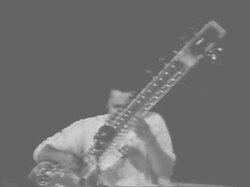From Bharatpedia, an open encyclopedia
Ravi Shankar performs Madhuvanti at the Shiraz Arts Festival in Iran in the 1970s
Madhuvanti is a raga used in Indian classical music . It is a Hindustani music raga, which is reported to have been borrowed into Carnatic music ,[1] [2] Multani .
This Raag is based on Todi Thaat (Mode). It is a romantic raga based on the foundation, eternity and colors of love. Madhu literally means honey . It is a very sweet raga with a very simple philosophy of love and romance.
Hindustani music [ edit ] Madhuvanti's notes are N S Mg M P N S'(Mg in meend) while ascending and all the swaras, S' N D P M g R S, in the descent. (notations M - , g-). Madhuvanti belongs to thaat Todi .
Madhuvanti is played after 4 pm before 8 pm.
Madhuvanti expresses a gentle loving sentiment. It depicts the sringaar rasa, used to express the love of an individual towards his or her beloved.
Carnatic music [ edit ] Madhuvanti is the janya raga of the 59th Melakarta of Carnatic Music, Dharmavati
Structure and Lakshana [ edit ] Dharmavati scale with Shadjam at C used as avarohana in Madhuvanti
Its
IAST (IAST: IAST)
structure (ascending and descending scale) is as follows:
IAST (IAST: IAST)
]]: S G₂ M₂ P N₃ Ṡ [lower-alpha 1]
IAST (IAST: IAST)
]]: Ṡ N₃ D₂ P M₂ G₂ R₂ S [lower-alpha 2]
The notes used are Chathusruthi Rishabham (R2), Sadharana Gandharam (G2), Prati Madhyamam (M2), Chathusruthi Dhaivatham (D2) and Kakali Nishadham (N3) .[1] [2] swaras in Carnatic music audava-sampurna raga (5 notes in ascending and all 7 notes in descending scale).
Compositions [ edit ] Madhuvanti is a popular raga. This raga has been used to compose many tukadas (short compositions sung towards end of Carnatic music concert).
It has also been used in Indian movie songs and music as it lends itself to lilting melodies.
Film Songs [ edit ] Language:tamil [ edit ]
Song
Movie
Composer
Singer
Kaadhal Kaadhal Endru Pesa
Uttharavindri Ulle Vaa
M. S. Viswanathan
P. Susheela ,M. L. Srikanth
Ammaanai
Avan Oru Sarithiram
T. M. Soundararajan , Vani Jayaram
Hello My Dear Wrong Number
Manmadha Leelai
K.J. Yesudas , L. R. Eswari
Mella Pesungal Pirar
Kasethan Kadavulada
Kovai Soundarajan, L. R. Eswari
Oomai Pennai Pesa Sonnal
Alaigal
S. Janaki
Kaalai Maalai
Gnana Paravai
K. J. Yesudas , K.S. Chitra
Nandhaa En Nila
Nandhaa En Nila
V. Dakshinamoorthy
S. P. Balasubrahmanyam
Ilam Solai Poothadhal
Unakkaagave Vaazhgiren
Illayaraja
Konji Konji
Veera
Natarajan Kudi Konda
Salangaiyil Oru Sangeetham
Yennullil Yengo
Rosappu Ravikkaikari
Vani Jairam
Vaazhvae Maayama
Gaayathri
B. S. Sasirekha
Vaanaville Vaanaville
Ramanaa
Hariharan , Sadhana Sargam ,Illayaraja
Hey Aiyasamy
Varusham Padhinaaru
S. P. Balasubrahmanyam , K.S. Chitra
Meendum Meendum va
Vikram
S. P. Balasubrahmanyam , S. Janaki
Otagatho Kattiko
Gentleman
A. R. Rahman
Idhu Sugam
Vandicholai Chinraasu
S. P. Balasubrahmanyam , Vani Jairam
Padal Naan Pada
Idhu Oru Thodarkathai
Gangai Amaran
S. P. Balasubrahmanyam
Oh Swarnamuki
Karuppu Vellai
Deva
S. P. Balasubrahmanyam , K.S. Chitra
Ulagathil Ulla
Thai Poranthachu
P. Unnikrishnan , Sujatha Mohan
Un Samayalarayil
Dhill
Vidyasagar
Thavaminri kidaitha
Anbu
Hariharan , Sadhana Sargam
Silendra Theepori Ondru
Thithikudhe
Sujatha Mohan
Tha Thi Thom
Azhagan
M. M. Keeravaani
K.S. Chitra
Un Azhagukku
Aalavandhan
Shankar–Ehsaan–Loy
Shankar Mahadevan , Sujatha Mohan
Kanaa Kaanum Kaalangal
7G Rainbow Colony
Yuvan Shankar Raja
Harish Raghavendra , Srimathumitha , Ustad Sultan Khan
Kanda Naal Mudhalai (Ragam Madhuvanti)
Kanda Naal Mudhal
Subhiksha, Pooja
Eno Uyirmele
Punnagai Poove
Bhavatharini
Vaada Bin Lada
Mankatha
Krish , Suchitra
Enakena Yerkanave
Parthen Rasithen
Bharathwaj
P. Unnikrishnan , Harini
Idhu Kathala
February 14
Haricharan
Aayiram Yaanai
Vallamai Tharayo
Nithyasree Mahadevan , Chinmayi
Unnai Thinam Ethirparthen
Kadhaludan
S. A. Rajkumar
Prasanna, P. Unnikrishnan
Unnai Saranadainthen
Ammuvagiya Naan
Sabesh–Murali
Harish Raghavendra , Kalyani
Vaaney Vaaney
Viswasam
D. Imman
Hariharan , Shreya Ghoshal
Kanna Thoodhu Po Da
Putham Pudhu Kaalai
Govind Vasantha
Bombay Jayashri
Muskurahat
Gangubai Kathiavadi
Sanjay Leela Bhansali
Arijit Singh
See also [ edit ]
↑ Alternate notations:Hindustani: S G̱ M̄ P N Ṡ Western: C E♭ ♯
↑ Alternate notations:Hindustani: Ṡ N D P M̄ G̱ R S Western: C B A G F♯ ♭
References [ edit ]
↑ 1.0 1.1 Ragas in Carnatic music by Dr. S. Bhagyalekshmy, Pub. 1990, CBH Publications↑ 2.0 2.1 Raganidhi by P. Subba Rao, Pub. 1964, The Music Academy of Madras
External links [ edit ]
Shuddha
Indu chakraNetra chakra Agni chakra Veda chakra Bana chakra Ritu chakra
Prati
Rāgas as per performance time
Morning Afternoon Evening Night Anytime Season


